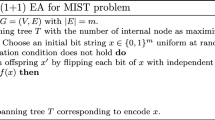Abstract
The Delay-Constrained Capacitated Minimum Spanning Tree (DC-CMST) is a recently proposed problem which arises in the design of the topology of communications networks. The DC-CMST proposes the joint optimization of the network topology in terms of the traffic capacity and its mean time delay. In this paper, an evolutionary algorithm which uses Dandelion-encoding is proposed to solve the problem. The Dandelion code has been recently proposed as an effective way of encoding trees in evolutionary algorithms, due to its good properties of locality. We describe the main characteristics of the algorithm, and compare its results with that of an existing heuristic for the DC-CMST. We show that our Dandelion-encoded evolutionary algorithm is able to obtain better results in all the instances tackled.
Access this chapter
Tax calculation will be finalised at checkout
Purchases are for personal use only
Preview
Unable to display preview. Download preview PDF.
Similar content being viewed by others
References
Lee, Y.J., Atiquzzaman, M.: Least cost heuristic for the delay-constrained capacitated minimum spanning tree problem. Computer Communications 28, 1371–1379 (2005)
Lee, Y.J., Atiquzzaman, M.: Exact algorithm for delay-constrained capacitated minimum spanning tree network. IET Communications 1(6), 1238–1247 (2007)
Thomadsen, T., Larsen, J.: A hub location problem with fully interconnected backbone and access networks. Computers & Operations Research 34, 2520–2531 (2007)
Astic, I., Festor, O.: A hierarchical topology discovery sevice for IPv6 networks. In: Proc. of the IEEE/IFIP Network Operations and Management Symposium, pp. 497–510 (2002)
Bejerano, Y., Breitbart, M., Rastogi, R.: Physical topology discovery for large multi subnet networks. In: Proc. of IEEE INFOCOM 2003, pp. 342–352 (2003)
Gavish, B.: Parallel savings heuristic for the topological design of local access tree networks. In: Proc. of IEEE INFOCOM 2003, pp. 130–139 (2003)
Esau, L., Williams, K.: On teleprocessing system design, part II. IBM System Journal 3, 142–147 (1996)
Chandy, K.M., Lo, T.: The capacitated minimum spanning tree. Networks 3, 173–181 (1973)
Papadimitriou, C.: The complexity of the capacitated minimum spanning tree problem. Networks 8, 217–230 (1978)
Karaman, A., Hassanein, H.: DCMC–delay constrained multipoint communication with multiple sources. In: Proc. of the IEEE International Symposium on Computers and Communications (2003)
Reeves, D.S., Salama, H.F.: A distributed algorithm for delay-constrained unicast routing. IEEE/ACM Transactions on Networking 8(2), 239–250 (2000)
Paulden, T., Smith, D.K.: From the Dandelion code to the Rainbow code: a class of bijective spanning tree representations with linear complexity and bounded locality. IEEE Trans. Evol. Comput. 10(2), 108–123 (2006)
Thompson, E., Paulden, T., Smith, D.K.: The Dandelion code: a new coding of spanning trees for genetic algorithms. IEEE Trans. Evol. Comput. 11(1), 91–100 (2007)
Deo, N., Micikevicius, P.: Prüfer-like codes for labeled trees. Congressus Numerantium 151, 65–73 (2001)
Picciotto, S.: How to encode a tree, Ph.D. dissertation, Univ. California, San Diego (1999)
Goldberg, D.: Genetic algorithms in search, optimization and machine learning. Addison-Wesley, Reading (1989)
Prim, R.C.: Shortest connection networks and some generalisations. Bell System Technical Journal 36, 1389–1401 (1957)
Author information
Authors and Affiliations
Editor information
Editors and Affiliations
Rights and permissions
Copyright information
© 2008 Springer-Verlag Berlin Heidelberg
About this paper
Cite this paper
Pérez-Bellido, Á.M., Salcedo-Sanz, S., Ortiz-García, E.G., Portilla-Figueras, A., Naldi, M. (2008). Solving the Delay-Constrained Capacitated Minimum Spanning Tree Problem Using a Dandelion-Encoded Evolutionary Algorithm. In: Li, X., et al. Simulated Evolution and Learning. SEAL 2008. Lecture Notes in Computer Science, vol 5361. Springer, Berlin, Heidelberg. https://doi.org/10.1007/978-3-540-89694-4_16
Download citation
DOI: https://doi.org/10.1007/978-3-540-89694-4_16
Publisher Name: Springer, Berlin, Heidelberg
Print ISBN: 978-3-540-89693-7
Online ISBN: 978-3-540-89694-4
eBook Packages: Computer ScienceComputer Science (R0)




